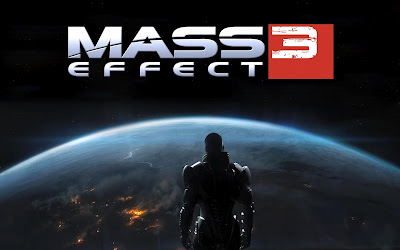Earlier this
month millions of players saw the N7 chest plate leave the Normandy’s bridge
for the last time; her engines are quiet now, and the stories of those she
carried to war finished... WRONG! Unless you were perhaps stranded on a planet
somewhere, you’ll probably have heard of the outpouring of displeasure by fans,
at both the way in which the Mass Effect 3 endings were laid out and the
endings themselves. In responce to this Bioware (the developers of the game)
released a statement saying that they were looking at altering the end game
sequences and cut scenes. This phenomenon brings up the idea of authorship and
the question; even if the Bioware can change the ending, should they?
Let’s
not forget fans have poured hundreds of hours into the Mass Effect canon,
investing time in a game that promised the idea of player defined narrative.
Surely then, from a moral and fiscal perspective it pays for the developers to
tailor their game to make the most players happy; and not be too precious about
maintaining the original content. Let’s not forget game development today is an
iterative process with DLC and patches being a common occurrence either
adjusting mechanics or adding new features, this plays to the malleable nature
of game design. Chris Avellone, Obsidian’s Creative
Director, writes “Our goal is to entertain our players. No one knows
more about what they consider “fun” than the player themselves. While you can’t
please everyone, there are iterations that make sense to do in DLC content and
sequels… we designed a good chunk of Old World Blues to specifically revolve on
you making a new homebase in New Vegas with all the improvements people were
pointing out.”
The problem with Mr Avellone’s example is that the changes made in the
New Vegas DLC were used to help during the development process prior to
publishing, not after the fact. Whilst I personally see gaming as more as a
craft rather than a solely artistic process, I can’t deny that one of the
places where artistry is strongest is in the creation of narrative and cut
scenes. Unlike most gameplay these cinematics are pre-scripted and designed by
the developers; so does this become a question of artistic licence and
authorship? For example, it’s quite unlikely that people would reasonably
expect a director to change the way he ended a film because they didn’t like
it. Steve Gaynor, Level Designer on BioShock 2, comments
“things like “cutscenes” and “endings”
are completely authored by the developers, and the developers altering the
authored content of a game after the fact has nothing to do with the systemic
player-developer collaboration described above… It’s not unique to games; it is
unique to a certain type of entertainment media that attracts fans who feel
entitled to dictate exactly how the product should bend to their desires,
instead of standing as a unique experience to be enjoyed, or not, on its own
merits.”
So is this just the self-entitled cries of the vocal minority? Well
anyone looking for resolution from me will be disappointed when I say, I don’t
know. Financially it makes sense for Bioware to modify their game to appeal to
the most people possible; and given the nature of game development not be overly
sensitive about their original creative vision. But when it comes to narrative
I feel this negates the idea of creative expertise and may prevent storytelling
at its’ most poignant, trying to please everyone may make no one happy. The design issue I have is this: one of the
tenets of Mass Effect is living with the reality of your actions; changing the
consequences robs the user of that reality. Fans could be depriving themselves
of what the so crave, a solid resolution. Perhaps the most relatable thing
players can take from Shepard’s life is that we don’t always get the story we
want.
So, what do you guys think post comments below…3, 2, 1….Thunderdome!
Quotes
were taken from an article in
http://www.pcgamer.com/2012/03/23/mass-effect-3-ending-what-do-game-writers-think/

"The design issue I have is this: one of the tenets of Mass Effect is living with the reality of your actions; changing the consequences robs the user of that reality. Fans could be depriving themselves of what the so crave, a solid resolution. Perhaps the most relatable thing players can take from Shepard’s life is that we don’t always get the story we want."
ReplyDeleteI see that you haven't played the game. While the 'tenet' of Mass Effect IS living with the reality of your actions, the ending of Mass Effect 3 completely disregards this. As a matter of fact, DESPITE your major (i.e. saving an entire species or settling the Geth/Quarian war) and minor (i.e. dialogue choices) decisions up to the final three minutes of the trilogy, the player can choose any of the three possibilities and watch a moving, if not confusing, cut scene of Shepard dying in one of three manners and the rEApers changing into one of three colors.
THAT is the paramount example of not living with the consequences of your actions. Sadly, an rEAper indoctrinated bioware will most likely avoid the consequences of its actions as well.